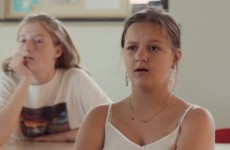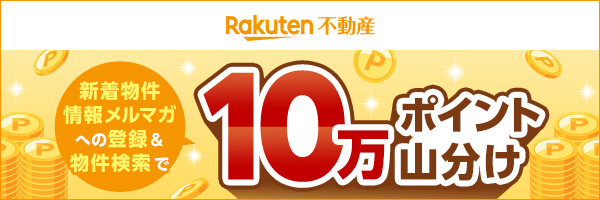.nl Issue:性教育授業中の中学生のリアクションを撮影した『Foreplay』Anne Van Campenhout監督/ Interview with Anne Van Campenhout director of ‘Foreplay’
NeoL / 2020年3月2日 17時0分
.nl Issue:性教育授業中の中学生のリアクションを撮影した『Foreplay』Anne Van Campenhout監督/ Interview with Anne Van Campenhout director of ‘Foreplay’
オランダのクリエティヴ業界を盛り上げているアーティストたちを取り上げる「.nl Issue」。近年、多くの国が国境を閉鎖しナショナリズムが高まり、世界共通の言語でもあるアートを通して団結することが以前よりも重要となってきている。NeoLでは、現在の状況と予測不可能な未来のために、議論ができる空間を様々な形で人々に提供するアーティストやアクティビストへのインタビューに取り組み続けている。本特集では、限界に挑み続け、フロントランナーとして走るオランダに在住するアーティストを紹介し、国の魅力についてはもちろん、今現在の環境、社会構成、政治などの問題を乗り越えるために必要とされる緊急性と行動力を喚起したい。
ティーンエイジャーにとって「セックス」は気まずいトピック。特に両親が自分を産むために行ったと知った時はなおさらだ。しかし、オランダ出身のAnne Van Campenhout監督はセックス未経験の多くの子供たちが、大人向けの性的コンテンツを見ているという事実を知り、思春期の子供が持つセックスに対する感情に興味を持った。
この年頃の子供の間で、「セックス」というテーマを真面目に扱うのはばかられやすく、実際、彼女も思春期の頃に自らの性的な関心に孤独を感じたそうだ。そんな自身の経験もあって、彼女は自分が思春期の頃にあれば助けられただろうと思えるようなドキュメンタリーを制作することにした。それがまさに性教育の授業中の中学生のリアクションを撮影した『Foreplay』である。彼女がセックスに関するドキュメンタリーを製作するのは2回目。前作の『My fucking problem』では、「膣炎」という普段話すのは拒まれるが、とても一般的なトピックを自然に描写したことで高い評価を受けた。今回は、アンに彼女の作品やオランダの映画産業の現状について話を聞いた。(→ in English)
ーーまずは『Foreplay』において、“セックス”というトピックを選んだ理由と、現在の社会情勢の中でこの話題を扱うことの緊急性を感じた理由を教えてください。
アン「まず、トピックを選んだ理由は子供向けの“性”に関するドキュメンタリーが少ないからです。そのために、子供達は彼ら向けではないセクシュアルなコンテンツを観ているのです。実際、オランダのデータを分析すると、より多くの若者が性的なコンテンツを観ているにも関わらず、性的な体験を初めてする年齢は、年々、平均年齢が16歳から18歳へと上がっていることがわかっています。また、自分の性的関心に気づくと、『こんな風に感じているのは世界で私しかいないんじゃないか』と感じて他人に話さないようになってしまう子も多いでしょう。でも、みんな同じように感じていることを知れたらたら気分が楽になるだろうと思うんです。だから、私が思春期の時に観たかったようなものを作りました。
また、昨今、私たちの社会はよりリベラルな方向へと向かっていますが、タブーと言われる出来事も増えています。例えば、ポーランドでは性教育がロリコンと同じだと考えられているため、性教育の授業の実施を犯罪としようとするムーブメントが広がっています。さらには性教育を実施してしまった教師は2、3年牢屋に閉じ込められるのです。
撮影方法については、インタビュー形式がいいなと思ったのですが、それだけだと生々しすぎると思ったので、それを囲むフレームワークが必要だと気付き、そこから性教育の授業風景を撮影するアイデアが浮かびました。性教育の授業を行った後で、インタビューを子供達にするスタイルを取ったことで、自然な流れが作れました。この機会が子供達にとって、自分のセクシュアリティについて話す初めての機会になったのではないかと思います。今、子供達にはセックスの知識が増えても、自分の気持ちをオープンに話すことが出来なくなってるという二重性の問題が存在しているんです。『Foreplay』という作品は、まさに今起こっている問題と繋がっているんですよ」
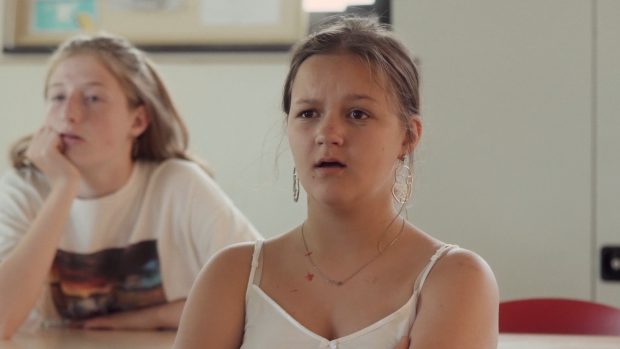
ーー12歳から15歳の中学生は、子供でもなく大人でもない、思春期の時期でもあります。なぜこの年齢層をターゲットしたのですか?
アン「セックスについて初めて知るのがこの時期だと思うからです。セックスを週に何回するのか、どうやるのか、叫ぶのは有りか無しかとか。最近、私の多くの友達がまだセックスを顔に射精する行為で終わらせていることを知って、少しびっくりしました。行動自体には全く問題はありませんが、これはポルノの影響だと思いますね」
ーーもともと予想していた中学生の反応を撮影したかったのですか? それとも、思春期真っ只中の子たちが持つセックスに対してどう考えているのか知るためにドキュメンタリーを作ったのでしょうか。
アン「彼らが性についてどう思っているのかにすごく興味がありました。学術的な証明よりも子供達はオープンだとは予想していましたが、実際のところを知りたかったんです。子供達は、自分の両親さらには自分のおじいちゃんでさえも、思春期に同じように悩んでいたことに気づきます。そして、親もセックスをしたことに気付き、それを自分があと数年後に“やる”と気づくと、気持ち悪いと思ったり、逆に興味が湧くのは世界共通で、みんなが経験することでしょう。もちろん、その人の置かれている状況によって差異はありますけどね。
『Foreplay』では、子供達がこのテーマに対して、必死にもがいている姿が見られると思います。“初めて”をどう想像するのかと中学生に訊いたのですが、彼らは事実とは掛け離れた、バラやロウソクが置いてある超ロマンチックな光景を描くと予想していたら、全く違う答えが返ってきました。男女問わず、相手に携帯を部屋の外に置いてもらうように頼むと言ったのです。その答えにはかなり驚きましたが、彼ら曰くセックス中の動画がネットに上げられ、学校中の人に見られるのを防ぐための策だそうです。実際、インタビュー内でも、数人の女の子たちが、セックス中の動画がネット上に載ってしまい退学になった子の話をしてくれました。彼女たちも動画を見たのかと訊いたら、『うん』と頷き、気の毒な気持ちが湧く前に笑ってしまったと素直に答えていました。その気持ちも分からなくはないです。携帯画面を顔面に差し出されて、友達か誰かに『これ見て』って言われたら、見たくなくても見てしまいますから」
ーー特に最近の子は若い頃からスマホを持っているし、何かが一回ネット上に上がってしまうと、それを完全に消すことは難しいですよね。
アン「逆にネットの存在が当たり前な時代に育った子供は、その危険性についてもかなり理解しているようですね。しかし、撮影を通じて、思っていたよりもずっとネットの子供への影響は大きいなと感じました」
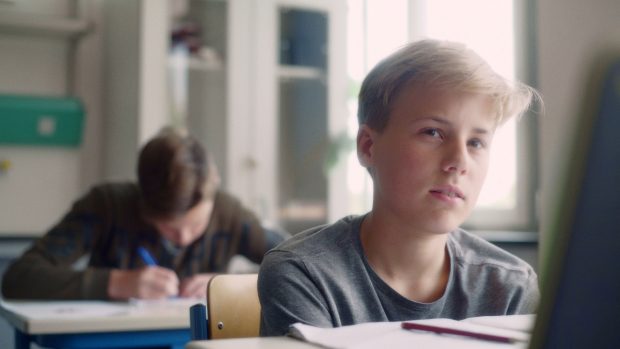
ーーオランダの様々な地区に位置する5校の中学校で撮影されたということですが、インタビューした子の中で特に印象に残った反応などはありましたか?
アン「ある男の子に性暴力の意見を聞いた時の回答が印象に残っています。私は、彼が相手の女性の気持ちを考えずに性行為に及んだ時、どうするのかを訊きたかったのですが、彼は、逆に女性である私(アン)が彼の承諾を得ずに何かをした場合について話してきたのです。私はこのような状況で、男性は絶対に犠牲者にはならないと勝手に決めつけていたので、自分のモラルを考え直しました。
でも、最初、彼が少しナイーヴに見えてしまうのを避けたくて、作品にこのシーンを入れるかすごく迷ったんです。だけど、彼の考えは非常に重要ですし、彼だけでなく他の男の子たちも考え込んでいる問題なのではないかと思い、結局彼のシーンも取り入れることにしました」
ーーあなたが予想していたドキュメンタリーを見た子供達の反応は、実際の反応と異なりましたか?
アン「上映開始前に何度か試写会を実施しましたが、なかなか難しかったです。というのも、子供達にとってセックスのトピックはかなり恥ずかしいもので、何も意見や感想を言ってくれませんでした。上映中、彼らの表情は変化し、お互いを観察しあっていました。“恥”という感情は、何かについて十分知識が足りない時に生まれる感情です。このドキュメンタリーを観たおかげで、少しでも彼らのその気持ちが薄れ、また刺激を与えられたのなら私は満足です」
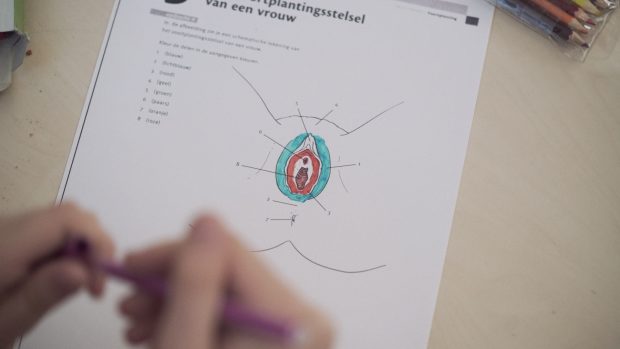
ーー前作の『My Fucking Vagina』では、「膣炎」という一般的だけど話しにくいトピックを扱いながらも、その自然な描写に高評を受けました。今回と前回の作品を比べて、制作していくうえで、何か異なった点はありましたか?また、「膣炎」というテーマを扱っていく上で大変だったことはなんですか?
アン「自分が主役のドキュメンタリー作品なので、いつもとは違う点がたくさんありました。まず、メインキャラクターが私の彼氏など、自分の周りの親しい人だったことは大きいですね。だけど、実は最初、作品に出演する気は無く、するとしてもインタビュアーくらいのつもりだったのですが、私自身が膣炎経験者の女性ということもあって自然にカメラが私に向けられました。そして、フィルムを編集している最中に、自分が出演したシーンを全て使うことになったんです。最初はなんだか違和感を感じましたが、いまでは自分がカメラの前にいることもだいぶ慣れましたね」
ーーでは当初は、自分を中心とする作品ではなかったのですね。
アン「そうです。性交が当たり前なものではないと感じている女性や直接的な性交をしなくても満足している人、双方の目線での作品を作りたかったんです。だから、様々な視点を持つ女性にインタビューしました。膣炎を経験したことがある女性の中でも意見は分れるんですよね。例えば、性行為無しの人生で幸せを感じている女性がいれば、ずっとしたくても出来ない女性もいます。実際、30年間ずっとしていない女性の話も聞きました。彼女の気持ちが時間の経過によって変わるかどうか知りたかったんです。でも、インタビュー中、彼女たちが逆に私にいろんな質問をしてきて、そこから徐々に自分が主人公になっていったという感じですね」
ーーこのドキュメンタリーを制作する理由はいくつかあったと思います。膣炎について情報発信をしたかったのも一つの理由ではないでしょうか。自分と似た問題を抱えている女性の話を聞くことで、あなた自身も何か変われた点はありますか?
アン「もちろんです。他の女性の話や意見を聞くことによって自分のことを以前より受け入れることができました。実際、ドキュメンタリーが公開されてから、1000件ほど女性からメールが届きましたね」
ーNeoLではシスターフッドに関連するトピックを繰り返し取り上げていますが、『My fucking probelm』の撮影を通して出会えた女性たちとの間にシスターフッドは感じましたか?
アン「そうですね。実際、多くの膣炎経験者の女性たちが私と話をしたいと言ってくれたのですが、一人一人と会う時間がなかったので、膣炎経験者の女性を集めて、皆で話せる会を開きました。それが8回ぐらい続きましたね。
このような会を企画するのが得意な友達に計画を頼み、彼女がフォーマルになりすぎず、会話を弾ませる方法を教えてくれました。そして、参加者には一人5ユーロ募金してもらい、その資金でヨガスタジオやフェミストの本が揃っている図書館などの場所を借りて、会を開催しました。その会では、『Letters to my Vagina』という自分の膣に対しての手紙を書き、みんなの前で読み上げたりと、様々なアクテビティーを行いました。膣痙経験者の女性の母親や姉妹、パートナーを連れてきた日もありましたね。膣炎を経験している女性のパートナー同士が話せる機会ってなかなかないと思うので、その日はとても盛り上がりました。
また、私だけが注目を浴びてしまうような会は避けたくて、女性同士が繋がれる機会を作るのが目標だったので友達に企画を頼んでよかったと思います。2年間ぐらい続いて、最初の会は約40人ぐらい出席していましたが、徐々に減っていき最終的には8人になって自然消滅した感じです。今はFacebook上でこの交流で続けています」
ーー彼女たちの状況を受け入れているパートナーが多かったですか?
アン「パートナーの膣炎を受け入れられない男性もいましたが、彼らの気持ちを聞くことも大切だと感じました。というのも、経験している女性ももちろん大変ですが、そのパートナーたちも同様に周囲になかなか理解してもらえず、大変な思いをしているはずです。だから、素直に『辛い』と男性同士が本音を吐ける場所が作れてよかったと思います。なので個人的にパートナーが一緒に訪問してきた日が一番印象的でした」
[caption id="attachment_93999" align="aligncenter" width="620"]
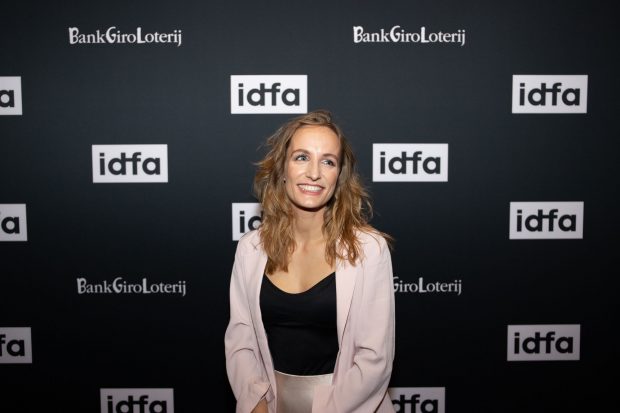
Anne van Campenhout[/caption]
ーー過去にも女性を中心したドキュメンタリーを制作されていますが、自分自身をフェミニズムの映画監督と思いますか?
アン「私が制作する作品は、性に関してオープンになることを促すものが多いです。私自身はフェミニストですが、自分の作品が女性の権利や不平等さを訴えるものではないため自分を『フェミニストな映画監督』と呼べるのかは正直分かりません。でも、いま考えてみると、私の作品は常に女性を題材にしているので、それが女性たちに間接的に良い影響を与えられているかもしれません」
ーーオランダはジェンダー平等などのトピックに関して、世界的にかなりオープンな国として知られています。オランダの女性監督は十分スポットライトを浴びられていると思いますか。
アン「良くはなってきていると思いますね。実際、映画学校のドキュメンタリージャンルを学んでいる学生は半分以上が女性ですが、フィクションのジャンルになると、まだ女性が少ないという現状もあります。また、フェミニズム的な表現をすることの難点は、テーマが「男女格差」や「女性の不利な面」になりがちなことです。仕事について女性にインタビューするとそんな答えが返ってくるのは普通のことなんですけどね。だけど、私は「女性映画監督が普通である」というメッセージを次世代の若い女の子に送りたいんです。だから、女性監督が少ないことを強調するのではなく、逆に女性監督であることのポジティブな面について考えていきたいと思っています。例えば、映画監督になりたい少女がいたとして、私としては彼女に「女性監督ってあんまりいないんだ」とがっかりさせたくなくて、それよりも女性監督というのが珍しい職種でなく普通のことであると思って欲しいのです。また、個人的に問題を指摘し続けるのではなく、ポジティブな局面に集中するアクティビズムが好きというのもあります。素晴らしい女性監督はたくさんいると思いますしね!」
text Ayana Waki
Anne Van Campenhout
Anne Van Campenhout is an Amsterdam based film director. Her work is characterized by urgency in topics and creativeness in style. She is specialized in documentary film, but does commercial and TV work as well.
https://annevancampenhout.nl/
https://www.instagram.com/anne.film/
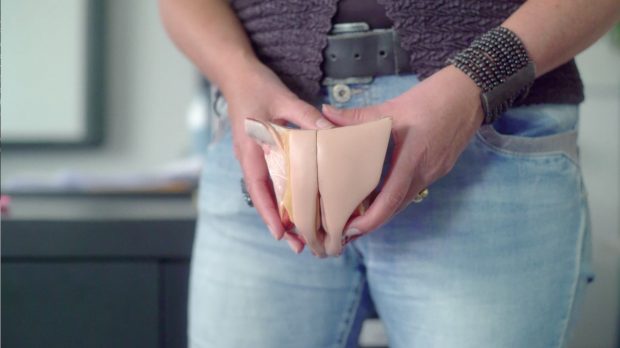
Sex can be an awkward topic for teenagers, especially the moment when you realize it’s an act that was committed by your parents, the creation of yourself as evidence. For Dutch director Anne Van Campenhout however it is more of a fascination, stemming from statistical evidence she found that proves kids these days are watching adult content at a younger age but having sex later on in life. She tells me that Foreplay -a short film documenting the reactions of middle schoolers during their sex education class- is a documentary she wished was available during her awkward phase so she could have felt ‘less alone’ an emotion that comes in hand with topics that are too stigmatized for them to be taken seriously. This is not her first rodeo when it comes to making films about sex, previosuly creating ‘my fucking problem’, a documentary that was critically acclaimed for it’s raw depiction of a hardly talked about but common topic; vaginism. She sat down with me to discuss further about her films and reflect on the positive realities of the Dutch film industry.
-Foreplay is a short film that documented the reactions of junior high school students in the Netherlands during their sex education class. What initially drew you to this topic and why did you feel a sense of urgency to make a film about this during the current social climate?
Anne: I made it for youth, that was the target audience and not for adults. Because I think there are no documentaries on sexuality for them but what they see more and more is sexual content that is not meant for them. I made what I wanted to see myself when I was that age, when you discover sexuality yourself, you feel as if you are the only one in the world and it’s not something to talk about with others. But when you realize that all of these feelings are normal and other kids have these feelings as well, it really helps to normalize it. At first what I found most interesting were the interviews. Then I thought I needed some kinds of framework. If it was just the interviews, it would be too vulnerable and so I needed to invite the young viewers to be able to open up to those interviews. The first chance they get to speak about it is through sex education. So I thought let’s use that as the framework and then they get curious about what is going on in spite of others so it’s a natural way to go into the interviews. I made something that I would have wanted to see but nowadays it’s even more relevant. In the Netherlands at least, studies show that more people see sexual content at a younger age but at the same time, the age they have sexual activity for the first time is ascending for the last ten years. It used to be 16. Now it is 18 when they have sex for the first time. I also think that it is more and more of a taboo thing. We become more liberal but for example, in Poland, they are now trying to criminalize sex education. They want to make it the same act as pedophilia. There is a duality and I think that is a problem because it makes you have more of an idea of how it should be and it becomes less easier to talk about how you feel. So that is why I wanted to make it.

-Junior High School is an awkward phase, in such that the age of 12 to 15 is when you aren’t a kid anymore but you still are not an adult yet. Why did you target this age demographic specifically?
Anne: The ideas that you have about sex, often come from that phase. The ideas of how many times per week or how it should look like or whether you should scream yes or no. I found out recently that a lot of my friend still end the act of sex with cumming in the face which if you think about it comes from porn. If you want to do it then that is absolutely fine but I do think where does that come from?
-Was there an initial reaction that you had predicted to come out and document from the junior high schoolers or was the documentary made to further understand the feelings that kids during this age have towards sex?
Anne: I was really curious about what they thought about sexuality. I thought that they would be more open but then I read all those studies and was just really curious as to how they actually felt. They are just in that phase that I reckon even my parents were in. Even my grandfather felt like that during that age and they can recognize it. Because that phase is universal when you are curious but also grossed out about it when you first realize that this thing that your parents were doing is something that you will be doing in a few years probably. It’s so far away and so close at the same time. In a way it's the same but the circumstances in which they grew up is different. You can feel that they are struggling to deal with this. So when I asked junior high schoolers how they imagine their first time, I thought they were going to answer in a really romantic way with roses. I thought it would be funny because we all know there are actually no roses and candles. But what they told me was that they will ask the guy or girl to leave their phone outside of the room. I never thought about that. But then I realized you only need to see one video of someone from your school exposed and the impact of that is so big. The whole school might see it. For example the girls in the film where they talk about the girl that went viral and got kicked out of school. When I asked if they had seen the video as well, they said yes. But it is almost impossible not to see it because you can try not to but if someone puts a phone in your face and says look at this, well you’ve already seen it. What can you do about it? You can feel sorry for her but I also liked how they first said 'yeah of course we laughed about it' because I understand.
-Especially these days when everyone has a phone and once something is on the internet you can try to delete it but it can never completely be erased can it.
Anne: In the mind of others at least. But at the same time, if you grow up with it you know the dangers of it and to be aware of them. And the impact that it has, I didn’t really foresee that.

-You filmed in five different junior high schools but out of all of the students that you interviewed was there one reaction that really took you by surprise?
Anne: It was when I asked a boy about sexual harassment about the things that would likely happen to him. I meant as in if he crossed the boundaries of a girl without intending to do so but he listens to it as if he would be the victim. That really confronted me and my assumptions because I assumed that the guy would always be the one being aggressive. For him he thinks what would I do if I were to cross my boundaries and I thought it was really confronting because I thought that he would never be able to be the victim because he is a man.
I didn’t know if I should include it in the film because I didn’t want him to look dumb but I think it says something about the assumptions we have about this and he really thinks about what he would do if he didn’t want to kiss the girl but she did. So it’s a really serious thing that he was thinking about. Then I thought ‘ok,this is probably something that other boys are thinking about as well’ so I included it.
-To the kids watching other kids respond to questions about sex education, how did you think they would react and were initial predictions different to the reactions you got after the screening?
Anne: I did some test screenings but I noticed that it was quite difficult. It’s because there is too much shame around this subject for them to really say how they feel. I noticed their facial expressions were changing and noticed how they were looking at each other but just not speaking out about it to me. But that is also ok. Shame is something that comes when you don’t know how to talk about a certain subject and you are unused to it but maybe next time they will feel less shame.

-We cannot talk about your work without mentioning your documentary ‘My fucking problem’ which was given praise for its raw depiction of this common but hardly talked about topic; vaginism. What was different in terms of the filming process of this short, was it difficult being the subject of the film whilst being the director of it simultaneously?
Anne: It was very different making a personal documentary. First of all because the main characters are everyone in your surroundings like my boyfriend. The whole process was different. At first I didn’t want to make it about myself. But then there was no option but to make it about yourself when you are so involved in the subject. So it didn't feel good to not include myself. I thought that I would include myself as only an interviewer but it was during the filming process when we were checking what to use during the editing process that we decided to use all of the footage. By the end of it, I just felt so comfortable seeing myself that it didn’t feel as intense as it was before.
-So at first it wasn’t necessarily meant to be a film surrounding yourself?
Anne: I wanted to make it from a perspective of a woman who didn’t find penetration obvious and if it is possible to have a nice sex life without penetration. I wanted to do interviews with women who had different point of views. There were people who were totally fine with their sex life without penetration but some who really wanted to have it, some who hadn’t had it for thirty years and my question was what changes over time. But then during the interviews they started to ask me questions. And it was very interesting what happened there so it was a very logical way for it to become more about myself.
-I can imagine you made this film with many intentions. One of them being spreading awareness about vaginism. After getting so many comments from other women saying they had similar problems, did creating the film help you in anyway?
Anne: I grew into it. A lot of the reactions from the other women helped me in feeling comfortable in it. I think I got about a thousand emails
-Neol concentrates on the subject of sisterhood but was there a sense of sisterhood amongst the women that you connected with during the filming of my fucking problem?
Anne: A lot of people wanted to drink coffee with me but there were so many that it was too much for me and I wouldn't be able to work so I asked them if they wanted to meet up together and I think we did eight times.
I asked my friend for help who knew how to organize and lead those types of groups. She would help me build a programme that didn’t feel too formal but does help people start up a conversation. We asked the women to donate five euros so that we could rent a nice place to meet. We set it up in a feminist library once and a yoga studio. We once wrote letters to my vagina and we would read them to the others so we would have something to start the conversation with.
I didn’t want it to be about me and I really wanted them to connect with each other so that is why I asked for her help and we did it for two years. The first one, almost 40 people came then at the end maybe 8 people, so less and less and it just felt logical to stop. But we continue to do it on Facebook. People brought their mothers, sisters and other people they wanted to talk about it with so they weren’t alone. As a group, one day we did a partner day where the women brought their partners and the partners could meet up. So not only the women could find help but the people around them.
-Were all of the partners accepting?
Anne: There were some who were not. It was important for them. It is tough for the women but it is also tough for the partners who feel bad for it because we want them to be accepting but also it is good for them to be with others and say ‘I hate it ‘and hear others say ‘I hate it’ too. Which is very important. I think the most impressive meeting was with the partners. There is no meet up for people who have partners that find sex painful. So it was the first time that they had a say in this topic.
[caption id="attachment_93999" align="aligncenter" width="620"]

Anne van Campenhout[/caption]
-Regarding that you do touch on female subjects, would you call yourself a feminist filmmaker?
Anne: I think they promote being open about sexuality. I am a feminist but I am not sure whether my films are about women's rights or inequality. Foreplay is a film also for boys but I am not sure, I have to ask myself whether or not my films are feministic. But now I think about it all of the films that I have made are always about women. So maybe in an indirect way.
-The Netherlands is famous for its openness and gender equality is less of a problem in this country than others. Are there enough female filmmakers that are getting the spotlight they deserve or do you think they are still underrepresented?
Anne: I think it’s becoming better. When you go to film schools especially in the genre of documentary filmmaking, more than 50% of the directors are female but for fiction, no. The thing I find difficult with being feministic in a way is making all of your subjects about inequality but it can just be a normal thing to interview women about their job. I like to look as it as a normal thing that women are directors more than making it a problem so this is why I want to emphasize not the fact that there are not enough female filmmakers but concentrating more on the positive side of being a female filmmaker. Because if you are a young girl that wants to be a filmmaker I don't want them to feel as if it is a problem that there are not enough filmmakers but that it is a normal thing to be a director. So that is the kind of activism that I like. To promote something rather than point at something and say what is wrong about it. And there are a lot of good filmmakers out there.
text Ayana Waki
Anne Van Campenhout
Anne Van Campenhout is an Amsterdam based film director. Her work is characterized by urgency in topics and creativeness in style. She is specialized in documentary film, but does commercial and TV work as well.
https://annevancampenhout.nl/
https://www.instagram.com/anne.film/
関連記事のまとめはこちら
https://www.neol.jp/movie-2/
この記事に関連するニュース
-
旅行者はGoogleを活用し続けつつ、AI生成のソーシャルメディアコンテンツにも肯定的
PR TIMES / 2025年1月14日 10時45分
-
この英語ってどんな意味?「 plot twist 」
OTONA SALONE / 2025年1月11日 7時0分
-
UESHIMA MUSEUM ANNEX オープンのお知らせ ~ 2025年1月15日より、今津景展を開催
PR TIMES / 2024年12月23日 15時15分
-
Shareholder Proposals to Japan Business Systems, Inc.
PR TIMES / 2024年12月22日 14時40分
-
【愛しとーと】国際機関ESQRの品質優秀ダイヤモンド賞「Quality Choice Prize 2024」を受賞!
PR TIMES / 2024年12月20日 13時45分
ランキング
-
1「高価な家電は使うな」移住先の“謎ルール”に困惑した32歳女性「ドラム式洗濯機や42型以上のテレビ」がNG。破った結果…
日刊SPA! / 2025年1月16日 15時51分
-
2一見好決算も株価は対照的な「ユニクロ」と「無印」、明暗を分けた要因とは?
MONEYPLUS / 2025年1月16日 7時30分
-
3【災害】2.5人に1人が経験した「停電」…「オートロックが開かない」「毛布だけではキツかった」 1000人調査で“リアルな被災経験”明らかに
オトナンサー / 2025年1月16日 21時10分
-
4「ツイン・ピークス」監督のデビッド・リンチさん死去、78歳…独特の映像美で「カルトの帝王」
読売新聞 / 2025年1月17日 5時11分
-
5「1リッターで【36キロ】走るクルマ」サイコー! トヨタ「低燃費コンパクトカー」何が凄い? 発売5年の「ヤリス」が売れる理由とは
くるまのニュース / 2025年1月15日 16時10分
記事ミッション中・・・
記事にリアクションする
![]()
記事ミッション中・・・
記事にリアクションする

エラーが発生しました
ページを再読み込みして
ください



